

Classes started with introductions of what unit each member came from, and how they got involved in the union. Members found out they had more in common than one would have expected, knowing the diverse range of their varied industries. Many members were motivated to be more active in the union because of their concern for their fellow workers.
“We needed proposals,” said Corin Kekua of Unit 4406, Honolulu Star-Advertiser, “and I wanted to put together something that would benefit everybody and represent different departments.”
“I was asked to be a steward because I’m tough and I like helping people,” said Jenniedane Arguilla of Unit 4526, Pacific Beach Hotel, now known as the Alohilani Resort at Waikiki Beach.
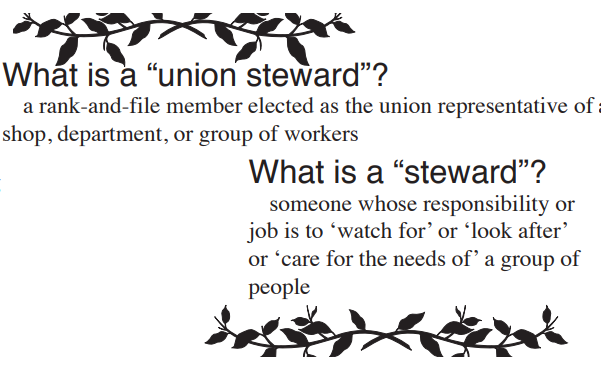
“I didn’t want any hocus pocus from management,” said Virginia Recaido of Unit 4526 Pacific Beach Hotel. “They can be volatile just as the market is volatile. I started to believe in the activism of the union because I felt it was good for common people like me to find a voice. We stick together and fight for it. You think it’s the union, but it’s actually us, speaking up and making change. We are the union. Not the staff or the business agents.”
Value of the union contract
Nearly every benefit on the job comes from the union contract.
In one of the exercises, stewards were given a sample union contract. Class instructor Michael Murata wrote down all the benefits the contract provided on the board: wage increases, overtime pay, work schedules, medical, sick leave, vacations, good working conditions and more.
The class went through each benefit individually, and whether each was a benefit workers are entitled to by federal law. Surely there would be a federal law to guarantee and protect something like a meal break, right?
The class was surprised to find out that meal breaks, among many other benefits, were not guaranteed by law. However, because unions have historically negotiated for things like meal breaks in their contracts, such a benefit is expected, and the norm. If a company did not offer it, its absence would be too glaring, so now most companies offer it automatically. Unions set the standard and the community benefits
“Keep in mind,” warned Murata, “management can give these, but they can also take them away because there’s no law in place that requires them to give them.”
“Wherever you go, there’s always the fear-of-the-unknown variable. The union contract helps with that a lot,” said Peter Terry of Unit 4416 - Polynesian Adventure Tours.
Many of the attendees knew and understood the value of the union contract. “I’m very grateful to ILWU,” said Christy Padello of Unit 4405, Foodland Super Markets. “My son was at Don Quixote for four years. He was doing the job of a manager who was there for 15 years and never got a raise from $12 an hour. I told my son, “What are you doing there? How can you want to stay at a job with no benefits for you? You need something more structured like a union contract. It’s such a big difference. I can’t believe people stay in non-union jobs for so long. But they just don’t know. They don’t know any better so they just stay. They need this kind of valuable information.”
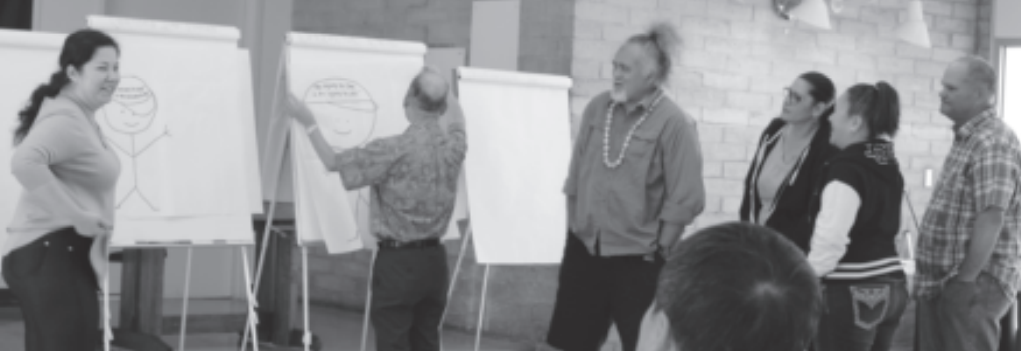
L-R: Ashlyn De La Cruz of Unit 4405 - Foodland, Instructor Michael Murata, Banner Fanene of Unit 4416 - Polynesian Adventure Tours, Donna Lankford, and Christy Padello of of Unit 4405, and Ivan Loughmiller of Unit 4420 - Hawaii Pacific Health doing the Communication Skills: Say What you Mean Exercise. One member looked at the picture Murata put up, and the other members had to draw it as accurately as possible based only on the verbal description that member shared. Communicating detail accurately is an important skill for a steward to have.
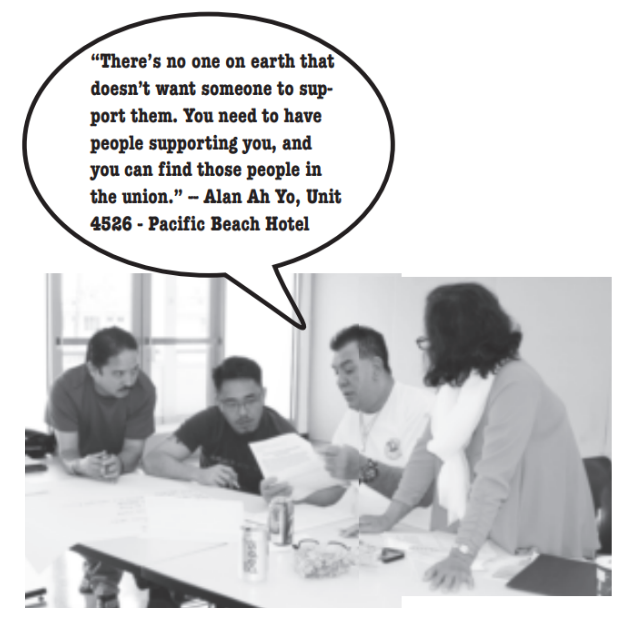
Richard Sanico, Charles Chung, Alan Ah Yo, and Virginia Recaido of Unit 4526 - Pacific Beach Hotel going through the “Know Your Contract Exercise.”
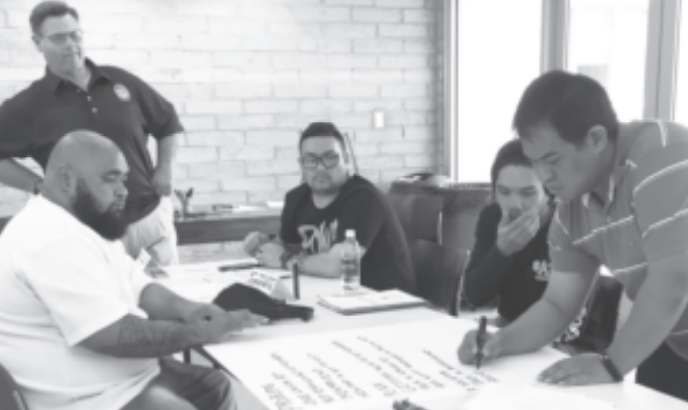
L-R: Rolani Jerome of Unit 4404 - Pepsi Beverages, Dylan Nakashima of Unit 4405 - Foodland, Jeremiah Malloe of Unit 4405 - Hawaii Logistics, Jason Vallejo of Foodland preparing their group presentation for the problem-solving at work exercise as Business Agent Dillon Hullinger offers guidance. ANSWER
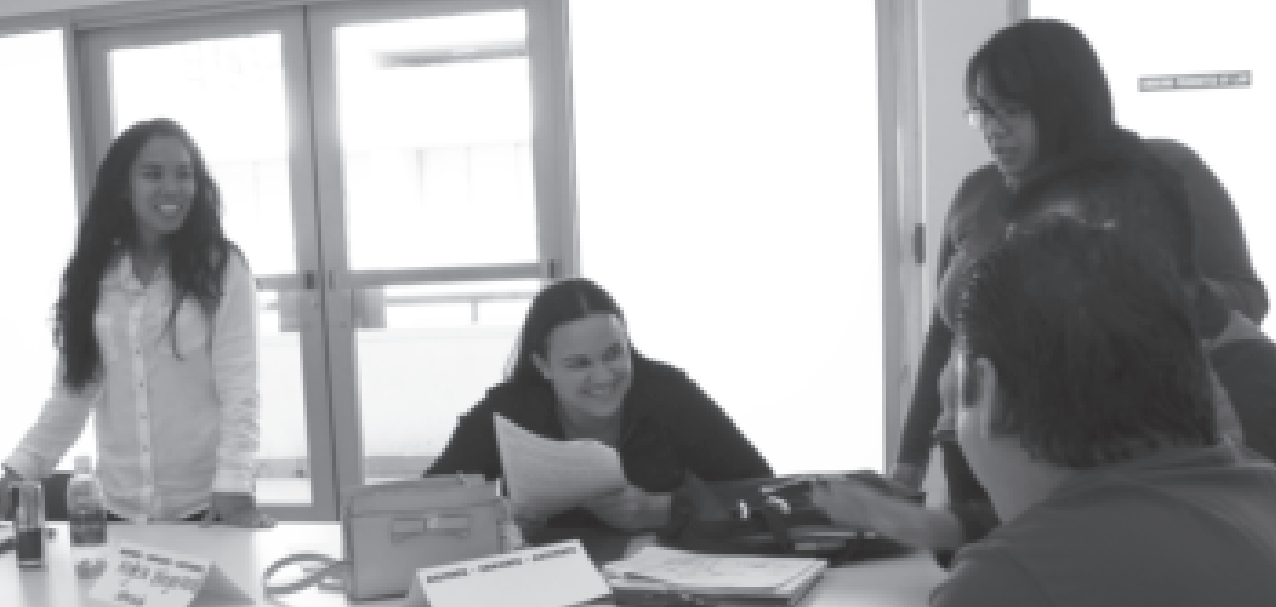
“I first got involved with the union because I got in trouble. And I wanted to learn more ‘cause I was nosy,” said Angela Wegesend of Unit 4420 - Straub Clinic and Hospital. “We’re not getting in trouble now,” added Mariah Ganaban, also of Straub. “We’re still known for our big mouths, but now it’s because we use it to speak up and help everybody.” L-R: Ganaban, Wegesend, Jessirae Dacuycuy of Unit 4420 - Straub.
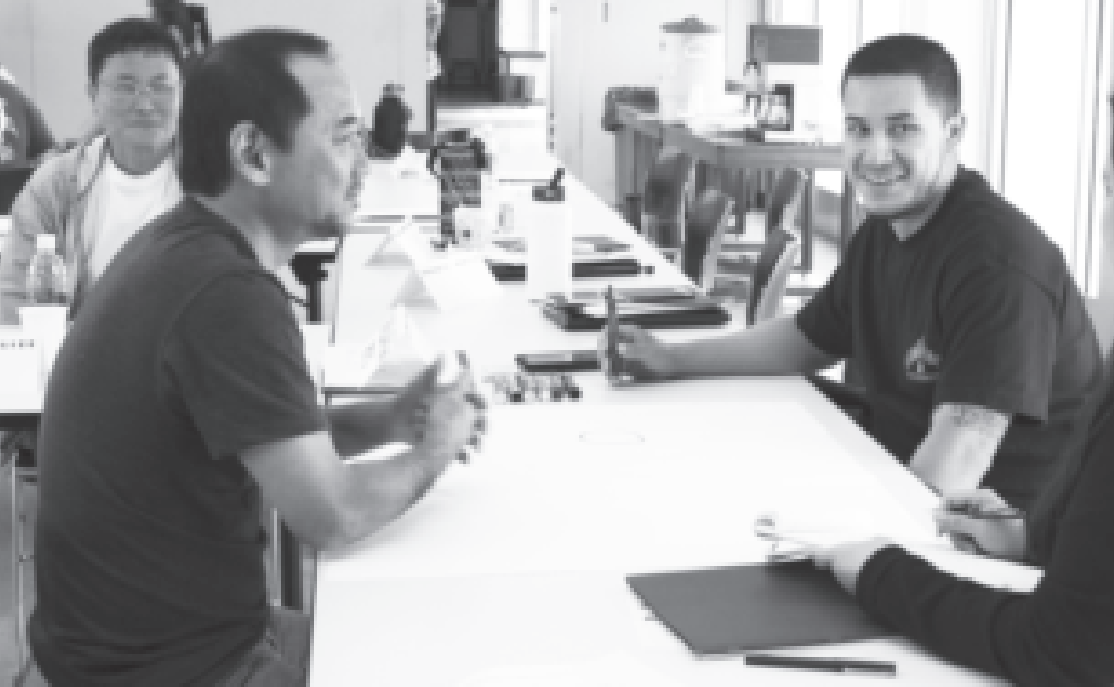
L-R: Sam Luo and Darren Iguchi of Unit 4412 Servco Pacific work with Like Salas of Unit 4404 Pepsi Beverages Co. on a drawing exercise that aimed to improve communication skills.
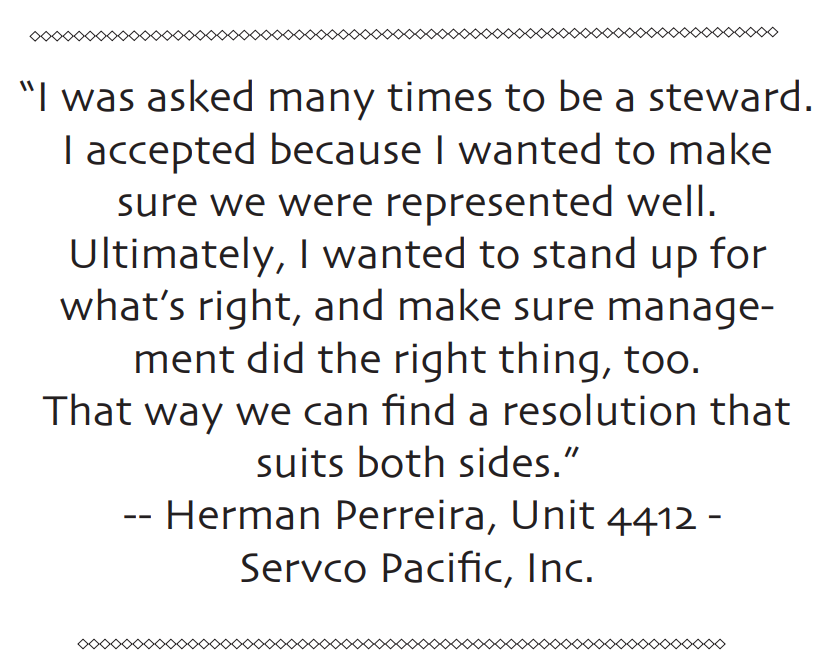
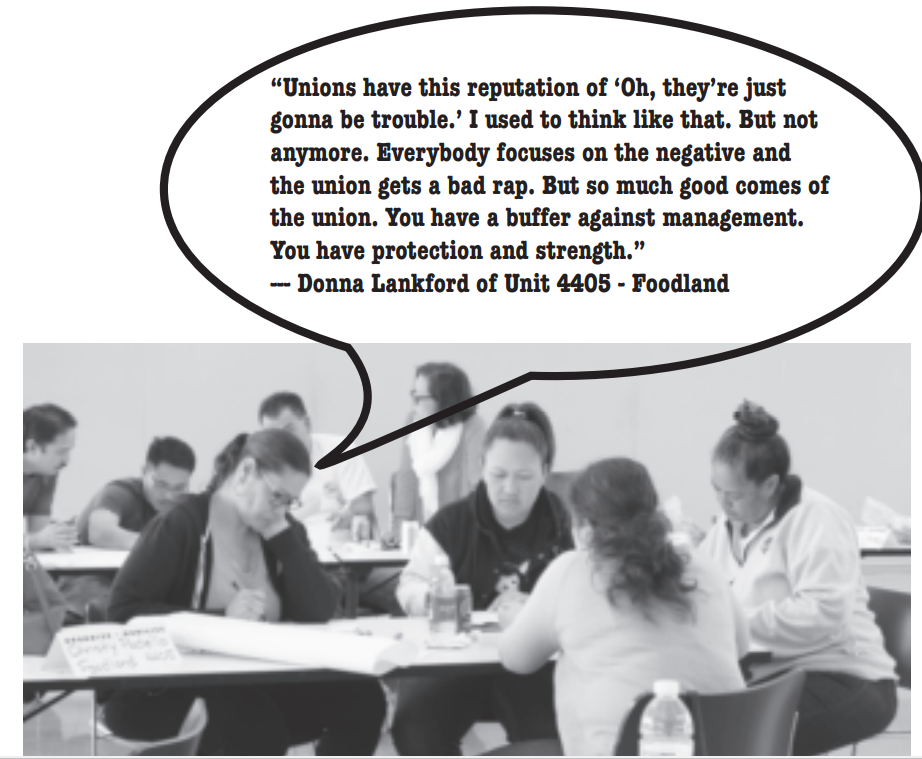
L-R: Donna Lankford, Christy Padello, Jaslyn Laurito, and Ashlyn De La Cruz of Unit 4405 - Foodland Super Markets work on an active listening exercise.
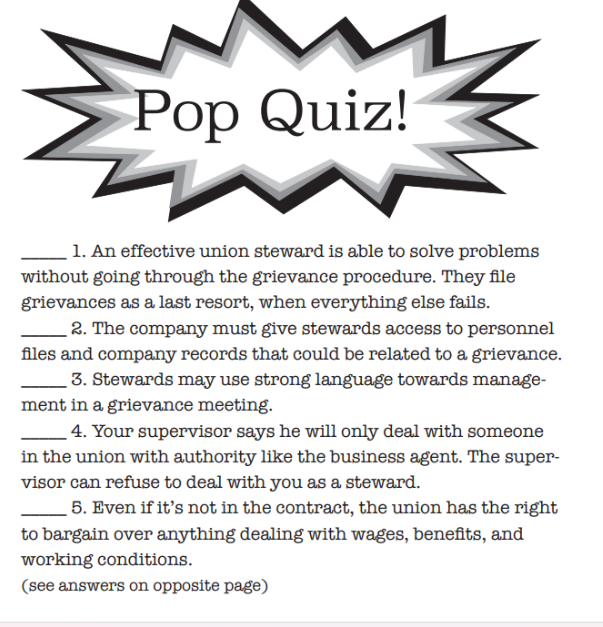
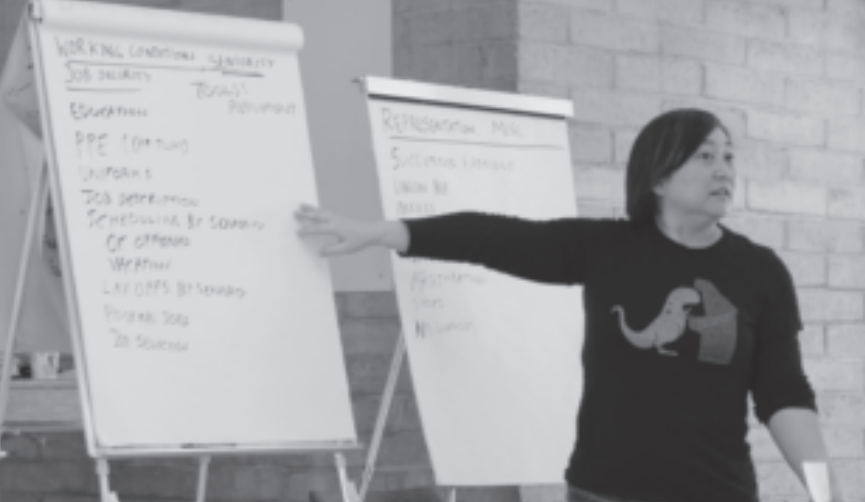
Mahalo and aloha, Eadie
The union will miss Eadie Omonaka as she retires from working at Local 142.
Omonaka was hired by previous Voice editor Mel Chang in 1991 as a layout assistant. She evolved her role since then in the union by taking initiative in many different roles in the union’s Publicity and Education Department and beyond.
“I was always impressed by her ability to sacrifice for this organization,” said Local President Donna Domingo. “She would do whatever she had to do to move the ILWU forward.”
“My whole view of the union changed because of her,” said Oahu Division Clerk Lisa Maehara. “I started working here thinking this was just a job. But she opened my eyes to people’s struggle. I saw her overcome her own fears to make stands because that’s how strong her beliefs are in all the things the union stands for: equality and rights for everyone. When I saw her attitude behind what we do in this union, this became so much more than just a job. It gave me meaning.”
Omonaka’s teaching style resonated with members because she understood the “why.” Why do we do what we do at the union? Why do we learn the nitty gritty labor laws and grievance procedures?
The lessons she put together would stick at a level beyond theory and facts because she could convey the information in a way that compels us to consider the bigger picture.
Nobody ever does anything because of logic; they do things because of emotion. And her deeply felt commitment to union values motivated so many people in her classes.
People in her classes or just members she helped would be inspired to take action empowered by a greater sense of vision, instead of just going through the motions: “I loved the active participation for reinforcement of themes,” went comments from her class. “The class just kept flowing. There were no lulls. It was excellent and so helpful to learn all this. I can’t wait to share what I learned with other members.”
“The best way I can describe Eadie,” said Secretary-Treasurer Guy Fujimura, “is that she has aloha for the union, and wants to make sure it continues.”
Thank you, Eadie, for your aloha and passion that carried the union forward. Your dedication to educating and supporting members kept the union true to its ideals.
The members you impacted will pass on the torch of empowerment with the spark of inspiration you struck.
